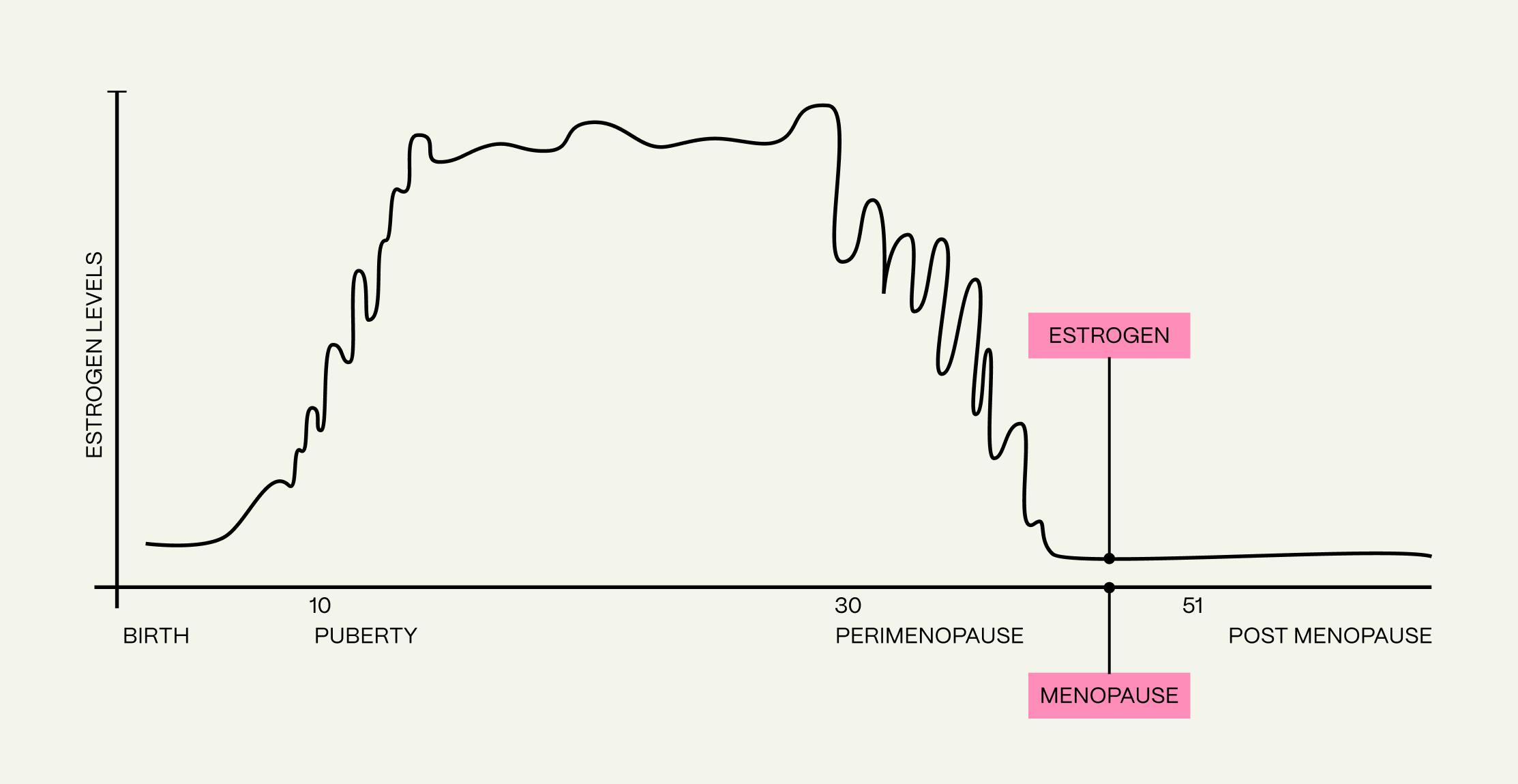Navigating perimenopause and menopause can be tricky, especially when some of their symptoms overlap with those of early pregnancy. Hormonal changes during perimenopause and menopause can even trigger false positives on pregnancy tests. In this article, we’ll break down the differences between pregnancy and menopause symptoms, helping you understand when it’s time to reach for a pregnancy test and when to brace for a hot flash. Whether you’re nearing the end of your childbearing years or already experiencing menopause, we’ve got you covered.
As you reach mid-life, you may start to worry less about unplanned pregnancies and more about menopause. Welcome to a confusing stage, since some of the symptoms of perimenopause and menopause can be similar to those of early pregnancy. And while you may be long done with growing your family, during perimenopause (the months or years leading up to menopause), pregnancy is still a very real possibility. As a woman in midlife, you may be wondering: How can I tell if I’m pregnant or just starting menopause?
While some pregnancy and menopause symptoms overlap, others are unique to each experience. This article breaks down everything you need to know about the differences between pregnancy and menopause symptoms to help you determine whether to reach for a pregnancy test or prepare for your first hot flashes.
Pregnancy vs. Menopause: What You Need to Know
The first symptoms of perimenopause can often be very similar to the symptoms of early pregnancy. If you’ve had children before, the symptoms may feel familiar because, just like when your body is preparing for pregnancy, menopause causes a dramatic shift in your hormone levels.
Changing Hormonal Patterns
While both pregnancy and menopause are marked by significant fluctuations in your hormone levels, each serves a different purpose.
When you become pregnant, your body prepares itself to grow and nourish a new life, primarily orchestrated by the presence of human chorionic gonadotropin (hCG) and elevated levels of estrogen and progesterone. These hormones trigger your body to produce a placenta, uterine tissue, and the environment a fetus needs to survive.
By contrast, the menopause transition is marked by a steep decline in estrogen and progesterone levels. Before your periods stop altogether, you enter perimenopause. During this time your body is reaching the end of its reproductive years and preparing to stop menstruating. You may go longer between periods, or skip cycles entirely—leading you to wonder if you’re edging up to menopause, or pregnant.
It’s perfectly natural to be confused by potential menopause symptoms. Working with a healthcare provider can help you prepare for the transition ahead. Midi clinicians are trained menopause specialists who can help you understand the “why” behind your menopausal body changes and offer a range of solutions, including prescription medications and lifestyle coaching.
Psychological Factors
Understanding the psychological factors associated with menopause and pregnancy is helpful in distinguishing between the two. In menopause, mood swings are linked to the fluctuation and gradual decline in estrogen levels, impacting neurotransmitters that regulate mood. Women may experience irritability, anxiety, sadness, and other shifts in mood, with these changes further influenced by factors like disrupted sleep and physical symptoms, which can include hot flashes, joint pain, weight gain and many more.
In contrast, mood swings during pregnancy are more abrupt and stem from the rapid hormonal shifts associated with gestation. Elevated estrogen, progesterone, and hCG levels affect neurotransmitters and emotional regulation. Pregnancy-related mood swings are characterized by short-term fluctuations influenced by factors such as fatigue, morning sickness, and sometimes depression or anxiety.
By keeping track of your mood and physical symptoms, you can make an educated guess about which change is happening to your body.
Common Misconceptions About Menopause and Pregnancy
Unfortunately, due to a general lack of education about women’s health, we absorb a lot of misleading information about menopause. Here are some common misconceptions about menopause:
- The myth: Menopause comes on quickly. Many assume that menopause sets in abruptly. In reality, it's a gradual process begun by perimenopause, which can span several years before full menopause.
- The myth: Menopause only happens after age 45. There's a misconception that menopause only affects women as they hit their middle to late forties. However, perimenopause can start in the mid-30s, or even earlier due to certain conditions, treatments for cancer, or surgery.
- The myth: Women experience the same menopause symptoms. Every woman’s menopause journey is unique. While hot flashes and mood swings are common, there are more than 34 documented symptoms of perimenopause and menopause. Individual experiences vary widely.
- The myth: Menopause symptoms last for a short time, then end. Symptoms of hormonal transition last, on average, for 7-10 years, and for many women, symptoms like hot flashes continue indefinitely.
Similarly, we learn a lot of inaccurate or outdated information about pregnancy as well (information we may believe even after having several children!).
- The myth: Pregnancy symptoms kick in quickly. Some believe that pregnancy symptoms begin immediately after conception. It often takes several weeks for noticeable signs like missed periods or morning sickness to appear.
- The myth: Women experience the same pregnancy symptoms. Similar to menopause, there's a misconception that all pregnancies follow the same trajectory. In truth, every woman has a unique pregnancy experience—and your experience may vary from one pregnancy to the next.
- The myth: Pregnancy is limited to physical changes. Pregnancy involves more than just physical changes. Emotional and psychological shifts, including mood swings and heightened anxiety, are other telltale symptoms of pregnancy.
Of course, everyone’s menopause journey is unique. To get personalized recommendations based on your symptoms and health history, you can book a virtual visit with a menopause specialist through a platform like Midi.
Similarities and Differences Between Menopause and Pregnancy
Menopause and pregnancy mark two completely separate stages of life, but their symptoms can seem surprisingly similar at times. Women in menopause and pregnant women may both experience mood swings, hot flashes, difficulty sleeping, and fatigue. Additionally, your period stops for both pregnancy (temporarily) and menopause (permanently), adding to the confusion. Initially, it can be easy to question which one you’re experiencing—until other, more specific symptoms show up.

Unique Pregnancy Symptoms
One hallmark symptom of pregnancy is, of course, morning sickness. If you’ve been pregnant before, you might remember those first few weeks hunched over the toilet dealing with morning sickness—that’s not a symptom that presents during menopause.
Additionally, while your breasts can feel tender during both pregnancy and menopause, pregnancy breast tenderness is accompanied by the growth of your breast tissue. And your body is growing more than just breast tissue–it’s creating a placenta, a womb, and a fetus, which puts additional pressure on the bladder. Increased urination can be a perimenopause and menopause symptom, but if combined with morning sickness and larger, more sensitive breasts, you’ll want to head out for that pregnancy test.
Unique Symptoms of Menopause
Menopause affects every woman differently, often with a constellation of surprising symptoms. In fact, the only universal element of this experience is that your periods stop for twelve consecutive months or more.
One common symptom of menopause is vaginal dryness, in which your vaginal and vulval tissue becomes thinner and less lubricated due to the drop in estrogen. This is the opposite of what happens to your vaginal tissue during pregnancy, when more blood is routed to your genitals to prepare you for childbirth.
You may also notice that your libido takes a nosedive during menopause (though this, like many others, isn’t a symptom for everyone). The drop in estrogen production directly affects your sex drive and can make your libido inconsistent. Other symptoms that are unique to menopause can include a change in your natural scent and increased UTIs.
What About Perimenopause?
Perimenopause is defined as the months or years leading up to menopause. Symptoms are often similar to what you experience once your period has totally stopped, but may be milder, or come and go.

Perimenopause most commonly occurs in your mid-thirties and early forties, and not all women experience perimenopause symptoms. However, for some women, perimenopause symptoms—which are consistent with menopause symptoms—can be truly uncomfortable and interfere with their day-to-day lives. If your symptoms are problematic, contact a specialist. They’ll be able to direct you toward effective treatments to control your symptoms and also protect against unwanted pregnancy, because that remains a real possibility.
Can Menopause Cause a False Positive on a Pregnancy Test?
As if all these overlapping symptoms weren’t enough to keep track of, menopausal women can get a false positive on pregnancy tests. During perimenopause and menopause, your pituitary gland actually produces hCG, the chemical that pregnancy tests identify. This can lead to false positives on home tests and inconclusive results on some blood tests.
If your symptoms are consistent with perimenopause or menopause but a pregnancy test is positive, call a gynecologist. Pregnancies during the perimenopause years are often high-risk due to complications such as gestational hypertension or diabetes. Risk of miscarriage is also high.
How to Best Determine Your Stage: Seeking Professional Advice
As you can see, navigating the stage of life where you could be pregnant, experiencing perimenopause, or entering actual menopause can be challenging. This is why it’s crucial to develop an open and trusting relationship with a provider that specializes in menopause during this transitional time. This could be with your regular provider or a clinician who specializes in menopausal women’s health.
Keep track of your symptoms—when they began, what time of day they crop up, and whether they’re increasing or decreasing in intensity. Sharing a detailed symptoms journal can help your clinician or doctor determine what tests—if any—are needed.
The Takeaway
- Perimenopause and menopause symptoms can overlap with early pregnancy symptoms, but each is driven by different hormonal changes.
- Hormonal fluctuations in both pregnancy and menopause impact your body, but serve different biological purposes.
- Menopausal women may experience false positives on pregnancy tests due to hCG production by the pituitary gland during this stage.
- Understanding these similarities and differences can help you pinpoint whether you're experiencing menopause or pregnancy.
- If symptoms are unclear, consult a healthcare professional for accurate diagnosis and guidance.
If you’re in perimenopause or menopause and want guidance from clinicians who specialize in women’s midlife health, book a virtual visit with Midi today.
Hormonal change is at the root of dozens of symptoms women experience in the years before and after their period stops.
Our trained menopause specialists can help you connect the dots to guide you towards safe, effective solutions.
Whether you need personalized guidance or a prescription routine to tackle symptoms—including brain fog, hot flashes, sleep trouble, mood swings, and weight gain—we’ve got you covered. Learn more here.
FAQs: Your Pregnancy and Menopause Questions, Answered
What are some common symptoms that overlap between pregnancy and menopause?
In addition to changes in menstrual cycles, common symptoms that overlap between pregnancy and menopause include hot flashes, mood swings, breast tenderness, and changes in libido. These shared symptoms can often lead to confusion about which life stage a woman may be experiencing.
Can perimenopause or menopause cause a positive pregnancy test result?
Yes, menopause can occasionally cause a positive pregnancy test result. This happens due to hormonal fluctuations typical during menopause. During perimenopause, the months or years before periods stop completely, a woman may still release eggs occasionally, and may have low but detectable levels of hCG (human chorionic gonadotropin), the hormone detected in pregnancy tests. Seeking professional medical evaluation is essential in such cases.
How can changing hormonal patterns make it difficult to differentiate between pregnancy and menopause?
Changing hormonal patterns during menopause and pregnancy can lead to overlapping symptoms, such as breast tenderness and missed periods, as well as mood swings and hot flashes. Menopause involves a decrease in estrogen and progesterone, while pregnancy entails an increase in hormones like hCG, estrogen, and progesterone. These hormonal shifts can create confusion in symptom interpretation.
What are some of the most common misconceptions about menopause and pregnancy?
Common misconceptions about the menopause transition include the belief that it only occurs in women over 50, when in fact it can begin much sooner, and that it solely involves hot flashes. Misconceptions about pregnancy may include the idea that morning sickness is a universal symptom (some women don’t experience it) or that only younger women can become pregnant.
How do pre-existing medical conditions influence the symptoms experienced during this stage?
Pre-existing medical conditions, such as polycystic ovary syndrome (PCOS) or low thyroid, can cause symptoms that overlap with both pregnancy and menopause. Healthcare providers must consider these underlying conditions during diagnosis.
What should I do if I receive a positive pregnancy test result during menopause or perimenopause?
If you receive a positive pregnancy test result during menopause or perimenopause, it's essential not to jump to conclusions. Seek professional medical evaluation, including blood tests and ultrasounds, to determine whether you are in fact pregnant, or if the positive test is due to menopausal hormonal fluctuations.
Is it possible to become pregnant during perimenopause, and if so, what are the risks involved?
Yes, it is possible to become pregnant during perimenopause. The risks associated with pregnancy during perimenopause include a higher likelihood of complications such as gestational diabetes and hypertension. Consulting a qualified provider is crucial for managing these risks and ensuring a healthy pregnancy.
How can I find emotional support and guidance while navigating the challenges of menopause and potential pregnancy?
Finding emotional support can be crucial during this stage. Consider joining menopause support groups, engaging with online communities, seeking support from family and friends, and consulting with healthcare professionals who specialize in women's hormonal health. These resources can provide valuable guidance and a sense of community during this transition.
Midi’s mission is to revolutionize healthcare for women at midlife, wherever they live and whatever their health story. We believe that starts with education, to help all of us understand our always-changing bodies and health needs. Our core values guide everything we do, including standards that ensure the quality and trustworthiness of our content and editorial processes. We’re committed to providing information that is up-to-date, accurate, and relies on evidence-based research and peer-reviewed journals. For more details on our editorial process, see here.
 Tabitha Wilson
Tabitha Wilson




